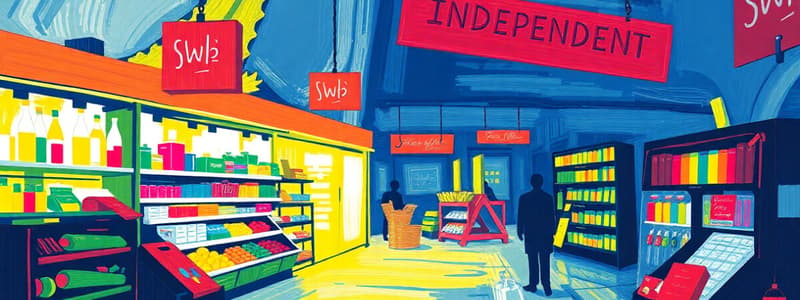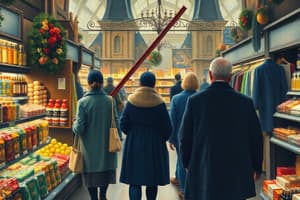Podcast
Questions and Answers
A manufacturer is seeking a retailer that can efficiently break down large shipments into smaller quantities for individual consumers. Which type of retailer is MOST suited for this purpose?
A manufacturer is seeking a retailer that can efficiently break down large shipments into smaller quantities for individual consumers. Which type of retailer is MOST suited for this purpose?
- Chain stores, because of them having a standardized appearance.
- Department stores, known for their specialized departments.
- Supermarkets, as they commonly engage in bulk breaking. (correct)
- Independent stores due to their personalized service.
A new business wants to maximize convenience for customers by offering a wide variety of products, free parking, and a location easily accessible for 'one-stop shopping'. Which retailer type should they choose?
A new business wants to maximize convenience for customers by offering a wide variety of products, free parking, and a location easily accessible for 'one-stop shopping'. Which retailer type should they choose?
- An independent specialist store with limited parking.
- A chain store located in a busy city center.
- A supermarket located on the outskirts of a town. (correct)
- A department store in the downtown core of the city.
What is a key characteristic that distinguishes department stores from other types of retailers?
What is a key characteristic that distinguishes department stores from other types of retailers?
- Small size and specialized product lines.
- High levels of customer service and product expertise. (correct)
- Low prices due to bulk buying.
- A standardized appearance across multiple locations.
A retailer aims to establish a consistent brand image and operational efficiency across multiple locations. Which retail model would best achieve this?
A retailer aims to establish a consistent brand image and operational efficiency across multiple locations. Which retail model would best achieve this?
Which of the following scenarios BEST exemplifies the added value provided by retailers, beyond simply selling products?
Which of the following scenarios BEST exemplifies the added value provided by retailers, beyond simply selling products?
A chain store decides to improve staff motivation to increase sales. Which strategy would be least effective, based on the typical characteristics of chain stores?
A chain store decides to improve staff motivation to increase sales. Which strategy would be least effective, based on the typical characteristics of chain stores?
Which competitive advantage is least likely to be held by a hypermarket compared to a traditional supermarket?
Which competitive advantage is least likely to be held by a hypermarket compared to a traditional supermarket?
A small business owner is deciding between opening a kiosk in a busy train station versus becoming a market trader who moves to different locations each week. Which factor should weigh most heavily in favor of choosing the market trader option?
A small business owner is deciding between opening a kiosk in a busy train station versus becoming a market trader who moves to different locations each week. Which factor should weigh most heavily in favor of choosing the market trader option?
A local crafts business wants to expand its sales. Which of the following options would allow for the broadest reach with the least initial investment?
A local crafts business wants to expand its sales. Which of the following options would allow for the broadest reach with the least initial investment?
Suppose a small business can choose between operating as a market vendor or a kiosk. If high customer volume is expected, which setup cost will most likely be higher for the kiosk option than for the market vendor option?
Suppose a small business can choose between operating as a market vendor or a kiosk. If high customer volume is expected, which setup cost will most likely be higher for the kiosk option than for the market vendor option?
Flashcards
Retailers
Retailers
Businesses that buy goods from manufacturers or suppliers and sell them directly to consumers.
Bulk Breaking
Bulk Breaking
Breaking down large quantities of goods into smaller, more manageable amounts for sale to customers.
Independents
Independents
Relatively small, independently owned stores.
Supermarkets
Supermarkets
Signup and view all the flashcards
Department Stores
Department Stores
Signup and view all the flashcards
Chain Stores
Chain Stores
Signup and view all the flashcards
Superstores/Hypermarkets
Superstores/Hypermarkets
Signup and view all the flashcards
Kiosks and Street Vendors
Kiosks and Street Vendors
Signup and view all the flashcards
Market Traders
Market Traders
Signup and view all the flashcards
Online Retailers
Online Retailers
Signup and view all the flashcards
Study Notes
- Retailers are businesses that purchase goods from manufacturers or suppliers and sell directly to consumers.
- Retailers offer services to manufacturers and sellers.
- Retailers buy in large quantities from manufacturers/wholesalers, and sell in smaller quantities to consumers, known as bulk breaking.
- Retailers are usually in convenient locations with good parking.
- Retailers add value by providing packing help, delivery, repairs, product information, guarantees, and gift wrapping.
- Businesses can select from various retailers to sell their products.
Independents
- These are relatively small outlets, like newsagents, general stores, greengrocers, delicatessens, and specialists such as bicycle, jewellery, and toy shops.
- Many are owned by sole traders.
- They are located on high streets, shopping centers or malls, small villages, and towns.
Supermarkets
- These are large stores that sell up to 20,000 product lines, including groceries, fresh food, greeting cards, clothes, electrical goods, and books.
- They are cheaper than independents because they buy in bulk.
- Many are located on the outskirts of towns and cities where land is cheaper.
- They usually offer free parking.
- They aim to meet the needs of consumers who prefer ‘one-stop-shopping’.
Department Stores
- These are large stores split into distinct selling departments, such as menswear, nightwear, cosmetics, food, gifts, and children’s clothing.
- They aim to provide quality products with high levels of customer service.
- Sales staff may receive training in the different products sold in their particular department.
- They are often found in city centers.
- Harrods in London, UK, is a department store.
Multiples or Chain Stores
- Chain stores involve one owner opening multiple stores selling similar goods in many locations.
- Each chain store looks similar and is controlled by a central office with standardised product range, pricing, storefronts, layout, staff uniform, and staff training and wages.
- Chain stores specialize in product lines such as menswear, children’s clothes, ladies clothes, shoes, food products, domestic appliances, sportswear, books or toiletries.
- They buy in bulk directly from manufacturers, so their costs and sales remain low.
- Their range of goods is often limited and staff may be unmotivated due to a lack of incentives.
Superstores or Hypermarkets
- Large stores located on the outskirts of towns sell a variety of goods under one roof.
- They are sometimes like warehouses.
- Hypermarkets offer shopping without non-essential services.
- Goods are not displayed attractively.
- They are cheaper than supermarkets and offer a wider product range.
Kiosks and Street Vendors
- These are small outlets selling a limited range of goods.
- They are in airports, bus and train stations, streets and at cinemas.
- They often sell fast food, confectionery, newspapers, and a limited range of clothes.
- They operate with low set-up costs and minimal overheads, but costs depend on location.
Market Traders
- Small-time businesses sell goods from market stalls.
- They are common with low overheads and are often cheaper than other retailers.
- Some market traders move between markets, and some sell their goods from the same permanently located stall like in souks.
Online Retailers
- Online retailers like Amazon buy goods from manufacturers and sell them to customers online.
Studying That Suits You
Use AI to generate personalized quizzes and flashcards to suit your learning preferences.




